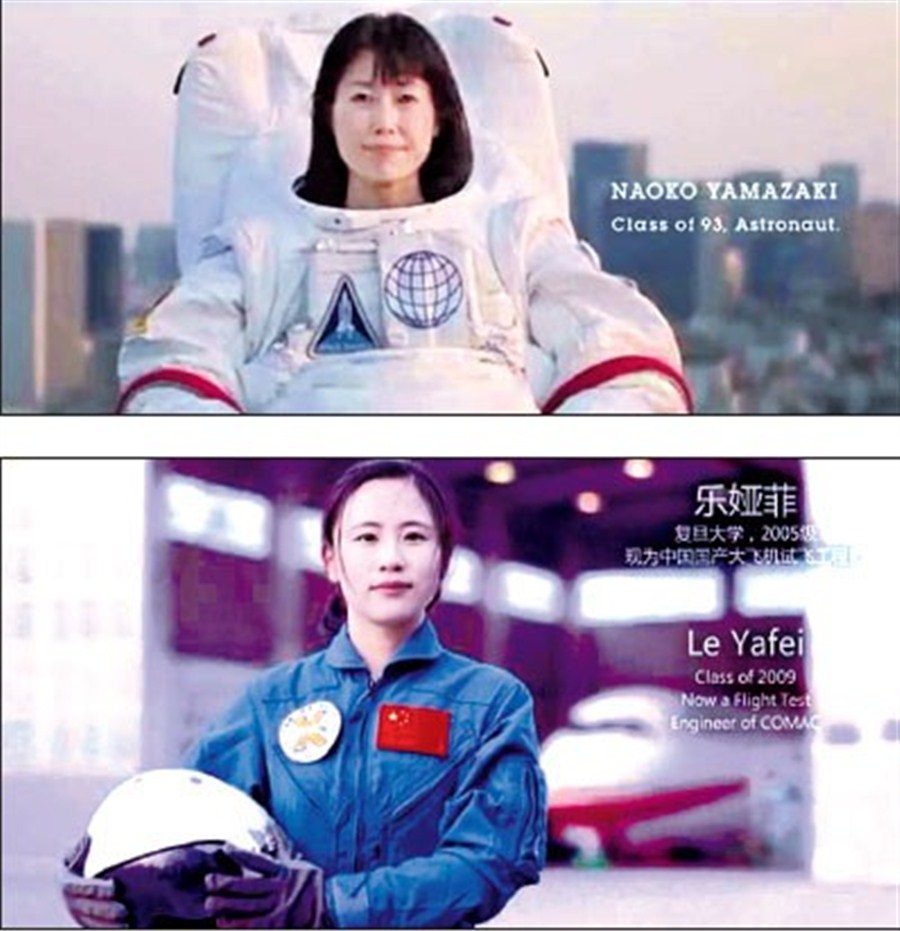Fudan University pulls publicity video over 'controversy'
 0 Comment(s)
0 Comment(s) Print
Print E-mail Shanghai Daily, May 29, 2015
E-mail Shanghai Daily, May 29, 2015
|
|
| Screenshots from the films produced by the University of Tokyo (top) and Fudan University (bottom). Fudan University removed the video from its website after being accused of plagiarism. |
Fudan University yesterday removed a promotional video from its website and other social media platforms following allegations that it plagiarized a Tokyo University publicity film.
"The video was removed from the official website, WeChat and Weibo accounts due to the controversy it caused," Xiao Sijian, head of the university's publicity department, told Shanghai Daily yesterday, adding that the school was investigating the two videos.
The five-minute film, titled "To My Light," released on Wednesday to mark the 110th anniversary of the school's establishment, shows a female graduate in a flight suit roaming about the campus and talking about her time at the university.
The film was shared online and the Shanghai government posted it on Shanghai Release, its Weibo account.
Some web users claimed it was very similar to a 2014 Tokyo University video titled "Explorer," which stars a woman in a spacesuit saying how she pursued her dream.
Both women wore helmets in the films, and took them off at the end. Both videos showed the women in school libraries and communicating with professors.
Fudan said any resemblance was coincidental.
Inspired by real events
It told Shanghai Daily the film was inspired by the real story of Le Yafei, who graduated from the dynamics department in 2009, and is now one of two female test flight engineers working for China Commercial Aircraft Corp.
"The video was an independent creation by Fudan," the school said in a statement.
Teng Yudong, deputy director of the publicity department, last night apologized for the upset caused by the film.
"As a producer, I shoulder responsibility for the bad influence on our school's image caused by the video," he said.
"I accept all the criticism and suspicion of our alumni and every one who cares about Fudan. I'm sincerely sorry."
Teng said his team watched promotional videos from more than 20 universities around the world and were inspired by the one from University of Tokyo.
Internet user "Shen Yu Xiao" said on zhihu.com that he had been proud to share it with his friends on WeChat, but later felt like he'd been "slapped in the face" when his classmates showed him the video by University of Tokyo.
"Everyone can see the similarities after watching the two videos," he said.
"People in charge of the video making program should apologize to all the famous professors and unknown students who had participated in the shooting for humiliating them in this way," he said.
Another person, identified as "Jin Du Jiang," said the "scandal ruined Fudan staff's happy mood at the 110 anniversary of the school's establishment."
A Fudan student, who asked not to be named, told Shanghai Daily that he hoped it was a coincidence.
"Fudan is a prestigious school with a history of 110 years," he said.
"It should be capable of producing an original video in honor of itself. I just cannot believe that some people had deliberately plagiarized another school's idea."
Le, who starred in the video, refused to speak to Shanghai Daily.
Shanghai Daily sent an e-mail to Tokyo University, but has not had a response.
Xiong Bingqi, deputy director of the 21st Century Education Institute, said Fudan should establish a panel, including school officials, students, alumni and media, to conduct a thorough investigation.
"The video was produced to promote the school's image. But it is very likely to ruin it now if the school does not treat the scandal properly," he said.
Xiong said the problem was "extremely serious" as the city is dedicated to build itself into a global center for innovation.
"Innovation is not only about new ideas and technology invention," he said.
"It also means the culture of respecting other people's innovative results."
A film critic also expressed her concern.
"There's no specific definition of plagiarism in films," said Shi Chuan, who is also vice president of the Shanghai Film Association.
"If you use a clip or frames from another work, of course you will need authorization. But it's hard to accuse a film of plagiarism, even though the audiences think it shares similar story line, scenes or camera movements with another one. Technically, they can only be accused of lack of originality.
"Sadly, such things are rather common. Many films, TV shows and movie posters borrow ideas from their foreign counterparts," Shi said.







Go to Forum >>0 Comment(s)